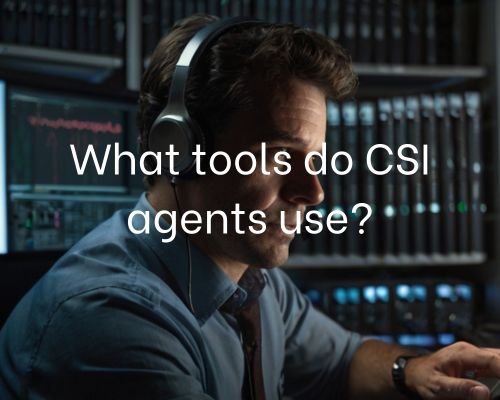When it comes to crime scene investigation, the tools that crime scene investigators (CSIs) use are crucial for securing and analyzing evidence.
A key tool for CSIs is the sexual assault evidence collection kit. It assists in gathering critical samples from victims and suspects.

Furthermore, refrigeration units and cooling systems are vital for preserving biological specimens that might be time-sensitive.
Based on Ali Private Investigator Tampa, CSIs also rely on a variety of specialized equipment, such as presumptive blood test supplies, to identify and confirm the presence of blood at a crime scene.
Tools like thermometers and traffic cones play essential roles in maintaining the integrity of the crime scene and ensuring accurate data collection.
Tools for Evidence Collection and Analysis
Forensic science relies on a wide range of specialized tools that allow crime scene investigators (CSIs) to collect, document, and analyze physical evidence meticulously. Understanding the purpose of these tools is crucial for preserving the integrity and reliability of the evidence. Let us have these with Ali Private Investigator Tampa.
Collection Instruments
Collection instruments are essential for gathering physical evidence at crime scenes.
Tweezers and forceps are used to handle delicate trace evidence like hair and fibers without contamination. For cutting, CSIs utilize scalpels and scissors. Scalpel blades can be replaced to ensure precision and cleanliness. Glass scribers are employed to mark items, such as glass or metal, for identification.
Evidence packaging materials include bags, envelopes, and boxes designed to store evidence securely. Tape is used to seal these containers to maintain integrity. To handle biological samples like blood, CSIs often use specialized kits to avoid contamination or degradation.
Documentation Equipment
Proper documentation is fundamental in forensic investigations.
High-resolution cameras and video recorders capture comprehensive images and videos of the crime scene and evidence. Photographs provide visual records, while sketches offer detailed layouts of the scene.
Notetaking devices help in recording observational details, and some teams employ digital tablets for efficiency. Magnifying glasses and microscopes assist in examining minute evidence, ensuring nothing is overlooked. Accurate documentation assists in reconstructing the scene during legal proceedings.
Trace Evidence Analysis Tools
Analyzing trace evidence requires specialized tools.
Microscopes are essential for examining small particles like fibers, hair, and even tiny glass fragments. Alternate light sources and lasers help visualize latent fingerprints and other substances not visible to the naked eye.
For chemical analysis, laboratories use advanced instruments to detect and analyze substances found on the evidence. Tools like the Gas Chromatograph-Mass Spectrometer (GC-MS) identify chemical compounds, enhancing the precision of trace evidence analysis.
Professional Skills and Operating Conditions
Crime Scene Investigators (CSIs) require a unique blend of professional skills and must navigate distinct operating conditions to excel in their roles. From analytical abilities to the challenges of working on call, this section highlights the essential skills and work environment of a CSI.
Requisite Knowledge and Expertise
As a CSI, you must possess strong analytical skills and a solid grounding in forensics, chemistry, and biology. Your work often involves meticulous examination of crime scenes, formulating theories, and understanding how different pieces of evidence fit together.
Educational requirements typically include a degree in criminal justice, forensic science, or a related field. Continuing education and certifications from reputable entities like the American Academy of Forensic Sciences or the International Association for Identification further enhance your expertise.
Attention to detail and being methodical are crucial for accurately collecting and analyzing evidence. On-the-job training and research are vital to staying updated with the latest forensic technologies and methods.
Workplace Dynamics and Challenges
Working as a CSI involves operating under various challenging conditions.
You may be on call, including weekends and holidays, and must be prepared to respond to crime scenes at any time.
Teamwork is essential, as you often collaborate with other investigators, police officers, and forensic experts. You should also expect to work in various environments, from urban settings to isolated areas, processing scenes that can be emotionally taxing due to the nature of the crimes involved.
Law enforcement agencies may employ CSIs as full-time members, while some might operate as civilian CSIs. Regardless of status, navigating the complexities of crime scenes requires both mental and physical resilience.
Career Path and Advancement
The career path for CSIs offers opportunities for advancement based on skills and experience. You may start as a crime scene technician and progress to roles such as crime scene analyst or even detective.
Salary ranges can vary. Entities such as the Bureau of Labor Statistics provide a median wage estimate. Meanwhile, self-reported data from sites like PayScale suggest variation based on location and level of expertise.
Certifications and on-the-job experience significantly impact your career trajectory. Participation in continuing education programs and professional associations helps in staying competitive. Many CSIs find value in pursuing higher education and specialized certifications to open doors to roles with increased responsibility and better pay.